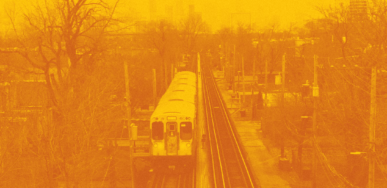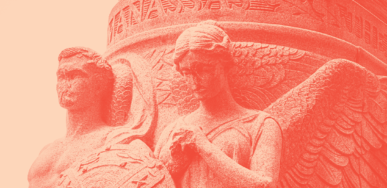
[00:00:03] Bremen Donovan It's about five o'clock in the evening on June 21st. The fête de la musique. It's an annual tradition. All across Paris, musicians fill streets, and parks, and bars to play. And whole neighborhoods come out to celebrate the summer solstice. Mothers are selling snacks and a deejay is setting up for a dance party that will happen later on the central place.
[00:00:32] Skander We don't make any barriers around skin color or religion. We've learned to live together. To be in community together. That's what makes our neighborhood so strong, I think. My name is Skander. I'm 25 years old. I live in Bellville, in a great neighborhood where there's an enormous amount of diversity.
[00:00:54] Bremen Donovan It's festive. But people are also on edge. They're worried about the police. For Skander, police harassment started when he was a young teenager.
[00:01:05] Bremen Donovan Est ce que tu peux me raconter l'histoire de la premiere fois, tu te souviens? (Can you tell me about the first time? Do you remember?)
[00:01:12] Skander We were young. We were hanging out on street in the evening with a bunch of Arabs, a bunch of Blacks, and so, when a police patrol passed, they stopped us. They put us up against the wall. They asked us if we had anything dangerous on us. They decided to touch us, to make sure we didn’t have stuff. They touched us in our private parts, to make sure we didn't have anything hidded in our butts. And for young boys, that can be really shocking.
[00:01:42] Bremen Donovan Things are getting worse with gentrification. Newer, mostly white residents are asking why kids are always hanging around outside. These same newcomers keep calling the police to complain. Skander himself has been stopped more times than he can count. He's Muslim, and as time goes on, he feels like the police are targeting him because of his religion.
[00:02:10] Skander Once they stuck me with a fine for drinking in public. I don't drink alcohol. I'm abstinent. It's been years and years since I’ve had a drop of alcohol. And they fined me for drinking alcohol.
[00:02:25] Skander It's beyond racism. I think that in France, there’s something against Islam.
[00:02:36] Bremen Donovan These are police officers who know him, and know his friends. But they keep stopping him for identity checks anyway.
[00:02:43] Skander They don't have anything to blame be for. So they stop me, and since they don't know how to get me, or how to make problems for me, they haven’t found a better way than sticking me with all these fines. They hit me in the wallet, right where it hurts.
[00:03:01] Bremen Donovan These stops are getting expensive. He's been slapped with so many fines in the past year, he doesn't have a chance of paying them.
[00:03:08] Skander I have a big family. I have lots of little brothers, I have my parents at home with me. A guy who makes 1200-1300 euros per month can't pay 300-400 euros per month in court fines. It's impossible.
[00:03:24] Bremen Donovan In addition to the financial burden, and the hassle of having to take time off work to show up in court, these frequent stops can be invasive.
[00:03:33] Skander I find it humiliating. To be touched. That there are people who touch us, often, and even worse, our private parts. Our butts, things that are hard to accept. That's how it is. They make us understand that we have to deal with it. As if it were normal, just a regular part of life.
[00:04:00] Omer The difference between me and the people younger than me is that I haven't integrated and I will never integrate the police identity check as something normal.
[00:04:09] Bremen Donovan This is Omer.
[00:04:10] Bremen Donovan He's a social worker and a community organizer working to try and make relationships better between young people, their families and the police.
[00:04:21] Omer The fact that I'm also Caribbean, and because I've been subjected to these same stops, but also the fact that I'm a social worker and that I work with these kids, I've developed a consciousness because of my experience of the impact it can have on young people.
[00:04:36] Bremen Donovan Omer's dealt with his own share of police profiling. What he finds most upsetting nowadays is how much young people seem to have resigned themselves to illegal stops.
[00:04:49] Omer The police don't even have to ask them to spread their legs apart. They just do it naturally, which isn't normal because the law does not provide for police stops to be like that—easy and constant. Police officers enter into sort of relationship of dominant to dominated, to show that they're the ones who have on the power. And touching people's genitals, that’s one of them. And that's why sociologists call it a ceremony of degradation, and it’s true. These are ceremonies of degradation because you feel like a piece of shit, basically.
[00:05:35] Bremen Donovan This kind of discrimination is a sort of third rail in French politics. It's as if somehow acknowledging what's going on amounts to a betrayal of the ideals France holds so dear. The ideals literally carved into stone on public buildings across the country.
[00:05:53] news tape Liberté, Egalité, Fraternité.
[00:05:57] Slim Ben Achour The cultural problem of the French is that since the French Revolution, we've lived in adoration of a principle that is wonderful. It's the principle of equality. But it's lived like a formal principle: "I declare that we are equal."
[00:06:19] Bremen Donovan This is Slim Ben Achour. He's a lawyer in Paris.
[00:06:26] Slim Ben Achour We're talking about 10 to 14 million identity checks done every year. And all of that on a really limited population, because the vast majority of the French population is never stopped.
[00:06:40] Slim Ben Achour We noticed that these 10 to 14 million police stops are concentrated on a limited number of people who we can identify as youth perceived as coming from working class neighborhoods and working class neighborhoods is a euphemism for talking about youth who are perceived as having North or sub-Saharan African origins.
[00:07:03] Bremen Donovan A 2009 study conducted by researchers at France's National Center for Scientific Research concluded that Black people in Paris are six times more likely to be stopped by police than whites. And [those perceived as] Arabs, seven point eight times more likely. It's related to what Slim calls the French cultural problem: the idea that the French state is colorblind.
[00:07:28] Slim Ben Achour Minorities don't exist in French law. It’s a concept, a notion, that doesn't make any sense. We have institutions that consider themselves innocent. In terms of discrimination, it’s just not possible. Because officially, racial discrimination doesn't exist. Republican principles mean that there is only one people, the French people, who all go to the same school, and it's not acceptable that some among us experience ourselves as minorities and discriminated against. So, it's quite complicated.
[00:08:01] Bremen Donovan The disconnect is related to histories that lots of people don’t like to talk about.
[00:08:13] Slim Ben Achour Once more, it's an identity check. It's you're nationality that's being checked. And if you're interested in the history of the French [national] identity card, there are dates that stand out. 1940-41. In other words, it's Vichy.
[00:08:23] newsreel The Vichy cabinet in session to consider the German demand for collaboration, to which they agreed.
[00:08:35] Bremen Donovan That's when the French government collaborated with the Nazis during World War II.
[00:08:40] Bremen Donovan The horrors of that period inspired the principles of nondiscrimination that France hold so dear.
[00:08:45] Bremen Donovan The prohibition against collecting sensitive data about race, religion and ethnicity is in response to a time when Jews in France were marked with stars and sent to die in concentration camps.
[00:08:57] Bremen Donovan Identity checks were also a form of control exerted in the French colonies, and the practice continued for certain populations living in the French Metropole.
[00:09:08] Slim Ben Achour And then it’s 1955, meaning, right before the beginning of the Algerian war, and the necessity to put in place a national identity card to control French Muslims who would come to mainland France.
[00:09:20] Slim Ben Achour In other words, there was a need to identify those whose nationality we needed to check. And these were the fathers and grandfathers of the kids that are being stopped today.
[00:09:33] Bremen Donovan Despite the government's history of targeting particular populations for identity checks, there’s still a widespread idea that discrimination isn't structural. It's personal.
[00:09:43] Slim Ben Achour You have a hard time getting people to understand the problem of structural discrimination because, well, that's not the French conception. The French conception is: it's flat, it's formal equality. It’s probably related to your own weakness, and if you want to be a victim, there’s not much I can do for you. It's a perspective on French society that I have decided to fight.
[00:10:11] Bremen Donovan The front lines of Slim's fight are French courtrooms. In 2016, in collaboration with community organizations, young people, and local activists, including Omer, Slim and another lawyer decided to sue the French state for its widespread practice of discriminatory police stops. They weren't just trying to get a couple bad cops. They wanted to strike at the heart of racial profiling. They had to figure out how to prosecute a case against structural discrimination in a country where structural discrimination supposedly doesn't exist.
[00:10:43] Bremen Donovan They wanted to bring a class action suit. But that's not really an option in French law. So there were gonna have to get creative. In addition to the challenge of getting a judge to recognize a pattern of discrimination, they had to deal with a standard of proof that was potentially very high.
[00:11:01] Slim Ben Achour When you're risking a prison sentence, well, you’re obligated, in French law, to provide complete evidence. So the problem for us was, on the one hand, to prove that the identity check took place; and then to prove in front of the judge that it was discriminatory.
[00:11:15] Slim Ben Achour In this case, that was going to be extremely difficult.
[00:11:21] Slim Ben Achour The difficulty in France is that there is absolutely no proof of police identity checks. To the point where police officers can deny having conducted an identity check.
[00:11:31] Bremen Donovan They had no official record to turn to.
[00:11:36] Skander How do I say this.....? You can't contradict a police opinion. What I mean is if a police officer says it happened that way, then the judge, the prosecutor, they'll say it happened that way. The police represent France. So when it comes to the justice system, they’re more interested in defending the police than in defending the people.
[00:12:00] Slim Ben Achour We had a real problem, which is that the police, like many social actors, had integrated the taboo around prohibition of racial discrimination.
[00:12:08] Bremen Donovan What Slim means is that officers aren't going to use racist language during the stop. When racism is there, it's often more subtle, more difficult to prove.
[00:12:19] Bremen Donovan As he was reflecting on possible legal strategies, Slim started to make a connection between a boss sexually harassing his employee, and a police officer stopping a kid because of his skin color.
[00:12:33] Slim Ben Achour I did criminal work when I was young lawyer, and I specialized in labor law. And I think that unconsciously, the asymmetrical relationship between employer and employee really made an impression on me. That's, I think, something that I projected onto the relation between the police and the rest of the population.
[00:12:50] Bremen Donovan Just like a boss would be sure not to leave proof that he was sexually harassing his employee, the French government wasn't requiring any official record of police stops.
[00:13:03] Slim Ben Achour Discriminatory behavior thrives on opacity.
[00:13:10] Slim Ben Achour And that's why you have an official adjustment of the burden of proof.
[00:13:14] Bremen Donovan France is part of Europe, and European law recognizes that discrimination exists and is often very difficult to prove. What this means is that certain discrimination cases, the burden of proof can be shifted away from the accuser and onto the accused. In this case, that would place the burden on the French state to justify the reasons for its disproportionate police stops. Slim's team jumped at this provision and began building a civil case.
[00:13:40] Police officers in France don't even have to give a receipt saying when they stopped you and why. This is a simple measure people have advocated for years to no avail.
[00:13:50] But since the judge officially shifted the burden of proof, the absence of such a record could become a central point in their case.
[00:13:57] Slim Ben Achour Is it natural, or normal, that a state, by its police, never justify its identity checks?
[00:14:07] Bremen Donovan The law says that if someone accused of discrimination doesn't cooperate by providing justification, well, then that fact itself suggests that discrimination might be going on.
[00:14:17] Slim Ben Achour No, a state with the rule of law cannot not justify such a stop. Especially when it's a massive practice that always affects the same people.
[00:14:30] Bremen Donovan There was more work to do to convince the judge of a structural problem. They turned towards social scientific studies showing how disproportionately non-white people are stopped by police in France. They reminded the court that during his campaign, former President Francois Hollande had stood before the U.N. in Geneva and acknowledged France's problem with racial profiling, vowing to address it.
[00:14:54] Slim Ben Achour This candidate, well, he didn't deliver on his promise. Nevertheless, in front of officials of the United Nations, in front of the international community, he recognized the problem of racial profiling and the commitment to resolve it.
[00:15:09] Bremen Donovan Despite its failure to follow through, his official acknowledgment before the U.N. supported Slim's case that there really was an institutional problem.
[00:15:18] Bremen Donovan Finally, their last move.
[00:15:21] Slim Ben Achour It's an element we didn't think of immediately because it's so obvious. It’s as obvious as air to a civil lawyer. It's the individual element, the personal element, that will eventually condemn the station. It's the attestation. Since the police don't wish to, and the state doesn't wish to justify their stops, in this case, then you have citizens who are presumed to be acting in good faith making attestations.
[00:15:48] Bremen Donovan If the police wouldn't document their stops, then regular people would. And they would bring their receipts to the judge. The attestation had three objectives. First, to establish the police stop. Second, to document any illegal behavior by the police officers involved. And third, to demonstrate by comparison, the police are targeting certain people and not others.
[00:16:12] Slim Ben Achour People aren’t doing anything at all. They're walking in the street, they’re chatting, and they get stopped. .
[00:16:21] Slim Ben Achour For example, you're in a place where people are doing their shopping, and it's only the Black person or the Arab person who gets stopped.
[00:16:30] Bremen Donovan Slim is talking about something that happens all the time and also about a specific incident where three young French citizens, all of them Black, were stopped by police for no apparent reason while doing their Christmas shopping at La Defense.
[00:16:46] Bremen Donovan The first trial took place at the district court in Paris.
[00:16:52] Slim Ben Achour First, the state said in front of the high court in Paris that there wasn't discrimination because the right to nondiscrimination and the principles of equality didn't apply to police identity checks. The state argued that the right to nondiscrimination simply did not apply to police stops.
[00:17:11] Bremen Donovan This argument did not go over well.
[00:17:16] Slim Ben Achour From a political standpoint—and from a legal standpoint, of course—it was an enormous error. Because the rules of nondiscrimination were created after the Second World War, after the Holocaust, and to say that the police don't have to respect the principles of equality and nondiscrimination, it just wasn't possible to pursue.
[00:17:38] Slim Ben Achour And so this argument—the state's argument—failed in front of the Paris Court of Appeal because that jurisdiction recognized that the principles of equality and nondiscrimination applied equally to the police.
[00:17:55] Bremen Donovan Slimness team got the judgment they wanted in the first trial. Then the government appealed. So the case went up to the Court of Cassation, the highest court of appeal in France.
[00:18:09] Slim Ben Achour And there, the French state will repeat this horrible idea by saying it makes sense that three Black French youth were stopped at La Defense because there could have been suspicion of non-nationality and of illegal presence on French territory.
[00:18:24] Slim Ben Achour Basically, the state argued that it had the right to stop these young men because they don't look French.
[00:18:30] Bremen Donovan Slim says his argument reflects a nasty reality about the way a lot of people in France understand what it means to be French.
[00:18:40] Slim Ben Achour You have the justification for the police stopping these three black French youth because they could have been foreigners. Which says a lot about the concept that certain people have of what it means to be French, and of French nationality. And it was unacceptable. And the Court of Cassation confirmed the decision of the Paris Court of Appeal by upholding racial discrimination.
[00:19:05] Bremen Donovan It's important to have judicial decisions that formally acknowledge the reality of racial discrimination in French policing. The acknowledgement is symbolic and could also pave the way for some systemic ways to address the problem of proof. Another significant outcome is the emergence of more cases like this one.
[00:19:24] Bremen Donovan While the class action suit was underway, a group of 18 young people on the 12th on this month, Paris filed a formal complaint against police officers in their neighborhood.
[00:19:34] Slim Ben Achour The kids from the neighborhood were subjected to violence by a particular brigade from the local police station.
[00:19:43] Bremen Donovan Again, the alleged abuse was taking place in a rapidly gentrifying neighborhood close to the center of Paris. And again, the young people concerned are working class and mostly not white. The harassment started with an I.D. check.
[00:19:56] Slim Ben Achour An I.D. check that wasn't aimed at checking identity, because the police know these kids—first names, last names, and addresses. So it's at best a pathetic and pathological way of saying hello.
[00:20:14] Bremen Donovan After lots of effort and advocacy, a formal investigation is finally launched, and in February of 2018, four of the accused police officers are put on trial.
[00:20:23] Bremen Donovan At the Palais de Justice, one side of the courtroom is filled with family members and people from the neighborhood there to support the kids. The other side is filled with police officers.
[00:20:35] Bremen Donovan Slim's team presents various evidence of the alleged abuse, including medical certificates and photographs.
[00:20:42] Bremen Donovan But for him, the most remarkable part of the trial comes a bit later.
[00:20:49] Slim Ben Achour The hearing revealed something that, well, quarters of us didn't know—which is, in the existence in the categorization of police identity checks, there you had a column for undesirables.
[00:21:11] Yes, really. The notion of undesirable is there.
[00:21:14] Bremen Donovan In a country where the use of sensitive data about race, ethnicity and religion is illegal, the testimony revealed that the police had been using “undesirable” as an alternative category.
[00:21:25] Slim Ben Achour All of this, in my opinion, contributes to the idea that these kids, they are not at home, they are not entirely French. And the question that comes up is: are the undesirables of today not the descendants of those perceived as children and grandchildren of immigrants from the former colonies? It is. There's a suspicion that is unacceptable. It's unacceptable. It contributes even more strongly to the rise of racism.
[00:21:58] Bremen Donovan The accused officers are all part of a brigade that calls himself the Tigers, after the menacing insignia on their uniform. Since the accusations against them were so severe, a judge ordered the on duty officers of the Tigers brigade to wear body cameras for the duration of the trial.
[00:22:18] Slim Ben Achour While three months after being ordered to wear a camera, we're going to see that the camera changes absolutely nothing about their behavior. That’s three months after filing the complaint.
[00:22:38] Omer And we hear the police say to the kids, yeah, but in any case, you think anyone's gonna trust you more, give you more credit for what you you're saying than somebody else? Basically, you're a little delinquent from the hood. You're a little kid from the hood. You're worthless. You represent nothing for society, okay?
[00:23:03] Slim Ben Achour And the question that came up for many of us was... are the police...excuse the expression, but are they stupid? They know they're the subject of a criminal complaint and they're recording themselves, audio and video, in the process of breaking the law. Specifically, identity checks with no legal basis at all.
[00:23:27] Bremen Donovan These body cam videos were leaked to the press so that the whole country could see what was happening.
[00:23:34] Slim Ben Achour The fact that the videos come out and let people see what police identity checks are, that changes a lot
[00:23:41] Slim Ben Achour Because these identity checks once again are being conducted by the famous brigade – they are in the sights of the criminal justice system. And despite that, they can't help themselves. They can't stop themselves from committing inequality and discrimination.
[00:23:55] Slim Ben Achour There are lots and lots of people, really good people, who came up to us saying, gosh, we didn't know.
[00:24:08] Bremen Donovan Winning in the courts is important, but it's an approach that takes time. People are angry, and that worries Omer, who's dealing with these things on a local level. Trying to have productive meetings with police, with young people, with their families.
[00:24:23] Omer The little guy we ran into earlier, he says to me, “I hate…” He drops the word. It's not just a concept, something he's conceptualizing. He drops the word. He says to me, “I hate cops.” What's important is for us to continue fighting. What's going to be important is for our politicians to finally listen to us, and for all of us to sit down at the table, and for them to understand that everybody wins if an entire segment of the population can grow up with parameters other than hate and anger. Because an angry kid who doesn't express himself.... well, we don't know how that's going to come out. Minority populations in France need to feel like we’re part of the French population.
[00:25:04] Bremen Donovan Omer wants to keep fighting, but he knows there's also a lot of resignation. Skander, for one, is fed up. He's being crushed with debt. He isn't seeing the changes come quickly enough. From his point of view, it's hard to be patient when you're constantly being harassed.
[00:25:26] Skander Truth is, people have been talking to us for so many years about changing things. Talking and talking about changing things. We’re not motivated anymore. We just do what it takes for the stop to take as little time as possible so that the police leave as quickly as possible. We don't want to talk to them anymore. We don’t want to cooperate with them anymore. That means they come, they do what they have to do, they leave. We—over the years we’ve seen that nothing's changed. So we don’t want to make an effort anymore. We don’t want to help people with whatever it is anymore. We just deal with it. Because we know that our opinion is worthless in this country. There's nothing we can do in any case. It's always the police who win.
We’re returning to our series Field Notes with a piece from graduate student Bremen Donovan, who reports on the longstanding problem of discriminatory policing against religious, racial, and ethnic minorities in France. This project was made possible through the Religion, Race & Democracy Lab’s documentary research program.
The French approach of de-legitimizing racial, ethnic, and religious categories is intended to prevent the targeting of particular individuals and groups. But the widespread practice of police identity checks France consistently targets people of color, populations presumed to be of Sub-Saharan or North African origin, and police are rarely held accountable.
How does a democracy founded on the idea of equality despite racial, ethnic, or religious identity confront the reality of pervasive discrimination based on race, ethnicity and religion?
Slim Ben Achour, a lawyer in Paris who has worked extensively on discrimination cases, attributes the intransigence to what he calls “the French cultural problem,” belief in the ideal of colorblindness and refusal to acknowledge the mistreatment non-white people face.
People of color are regularly made to feel like they are not entirely French.
Regular people, like Skander, a 25 year-old Parisian who has experienced relentless harassment since his first experience of being stopped and frisked as a young teenager. In the neighborhood he grew up in, not far from the Place de la République, Skander, who’s Muslim, has been stopped more times than he can count. He doesn’t drink alcohol, but has received fines for drinking in public. In 2018 alone, he had to appear in court 17 times for summons related to police stops, several hundred euros each.
Police identity checks have become “a pathological way of saying hello,” Slim says. Officers often already know the names of the people they are stopping, and where they live, and still they continue to stop them regularly, demanding to see their papers.
French people who don’t get stopped all the time for no reason tend to assume there’s no smoke without fire—that people who are getting stopped by police must be up to no good.
So-called “identity checks” can be invasive, humiliating, and sometimes violent. People who regularly face such heightened discrimination and violence know why they are disproportionately stopped. But the reality of racial profiling—contrôles au faciès—is difficult to prove to white populations who don’t want to see it.
The ideology of colorblindness holds that prejudice is a personal problem, not an institutional one—that individuals in France may have prejudices, but French institutions treat everyone the same.
Slim and others have decided to fight this battle in the courts, seeking to prosecute the case against racial discrimination in a country where racial discrimination supposedly doesn’t exist.
In this episode, they guide us through their journey.
How to cite this episode:
Halvorson-Taylor, M., Schaeffer K. (Presenters), Donovan, B. (Reporter), & Gadek, E. (Producer). “Field Notes: Liberté, Egalité, Contrôle d’Identité.” Sacred & Profane (2020, July 6).
Additional Reading
Beaman, Jean. “Citizen Outsider: Racism, Marginalization, and Immigration in France,” Metropolitics, 31 May 2017. URL: http://www.metropolitiques.eu/Citizen-Outsider-Racism.html
Boutros, Magda. “La police et les indésirables,” La Vie des idées, 14 septembre 2018. ISSN : 2105-3030. URL: https://laviedesidees.fr/La-police-et-les-indesirables.html
Chrisafis, Angelique. “Former students sue French state for ‘racist’ stop and search,” The Guardian, 22 October 2018. URL: https://www.theguardian.com/world/2018/oct/22/former-students-sue-french-state-for-racist-stop-and-search
Diallo, Rokhaya. “France is still in denial about racism and police brutality,” Al Jazeera, 11 June 2020. URL: https://www.aljazeera.com/indepth/opinion/france-denial-racism-police-brutality-200609133104476.html
Goris, Indira, Fabien Jobard, René Lévy, James Goldston (ed.), William Kramer (ed.), and Rachel Neild (ed.). “Profiling Minorities A Study of Stop-and-Search Practices in Paris,” Open Justice Initiative, June 2009. URL: https://www.justiceinitiative.org/publications/profiling-minorities-study-stop-and-search-practices-paris
Additional Credits
Very special thanks to Skander, Issa Coulibaly, Omer Mas Capitolin, and Slim Ben Achour. And to Clinton Johnston, Louis Hampton, Riel Paley, and James Johnson, who read their words. Thanks also to Jean Beaman, Magda Boutros, Léonard Boniface, Stéphanie Barillé, and Alison Levine.
(Top banner)
Photo by Bremen Donovan








